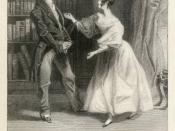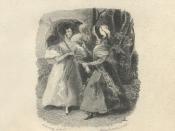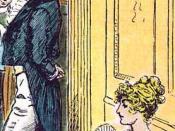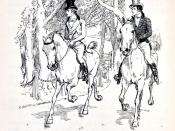How does Austen present the relationship between Lizzie and Darcy in the first twenty chapters of the novel?The relationship between Elizabeth and Darcy is without doubt an incredibly tempestuous one, but the main problems at the start of their relationship all arise because of their own personal qualities, through the charactersÃÂ own faults, though it is ironic as neither character is able to see their own faults. The pride and prejudices of both characters leads to an incredibly bad first impression,and the effect of this resonates throughout the book and their relationship.
Class difference is arguably the biggest barrier to the relationship between Elizabeth and Darcy, as both characters are very aware of their difference in social stature. Darcy looks down on Elizabeth because of her family and their inferior social connections, and so despite the fact that Elizabeth is the ideal match for him, he tries not to let himself fall in love with her.
He firsts meets Elizabeth at the Meryton ball, and at BingleyÃÂs suggestion that he dance with Elizabeth, he replies that she ÃÂis tolerable; but not handsome enough to tempt meÃÂ. His reaction shows how he views the people of Meryton, and it is clear that he sees them all as his social inferiors, and because of this he refuses to dance with someone who is ÃÂnot handsome enoughÃÂ for him. He also expresses this thought with ElizabethÃÂs hearing, and this further shows his arrogance, as he does not even care as to whether or not she hears him because she is so inferior to him. The rudeness that Darcy treats Elizabeth with here creates a very negative picture of Darcy in her mind. This comment shows DarcyÃÂs own sense of social superiority, and shows that for him, their class difference is the main difficulty in admitting his love for Elizabeth.
Both characters have a great deal of pride, and on occasion it borders upon arrogance. Elizabeth considers Darcy to be incredibly arrogant, but is unable to see how proud she can be occasionally. DarcyÃÂs pride is mainly due to his social superiority in life, whereas ElizabethÃÂs pride stems from a belief in her own intellectual superiority, and she struggles to admit when she is wrong. Elizabeth, when talking to the Bingleys and Darcy, says ÃÂYes-I understand you perfectlyÃÂ. This suggests that she is showing them that though she is not their equal socially, she is intellectually. The hyphen after ÃÂYes-ÃÂ creates a pregnant pause, and Elizabeth soon follows with ÃÂI understand you perfectlyÃÂ. The use of the word ÃÂperfectlyÃÂ is unnecessary, and shows ElizabethÃÂs total self assurance, and this makes her appear arrogant. Mr Darcy is seen to be extremely arrogant and conceited by the inhabitants of Meryton after the first ball, because he did not deign to socialise with any of them. Mr Darcy, however, believes instead that ÃÂpride-where there is a real superiority of mind, pride will always be under good regulationÃÂ. This shows how he believes that as long as there is a ÃÂsuperiority of mindÃÂ, pride will never go on to become arrogance, and will be well-managed, and this is very ironic because both Darcy and Elizabeth have this ÃÂsuperiority of mindÃÂ, and are both very clever, but both can easily be seen as arrogant.
Another important similarity between the two is the fact that they are each otherÃÂs intellectual equals, and this is arguably one of the main reasons that they are so good for one another. When discussing what the perfect woman must be in order to be perfect, the one thing that Darcy adds to the extensive list of accomplishments deemed necessary is ÃÂthe improvement of her mind by extensive readingÃÂ, and he says that this quality is ÃÂmore substantialÃÂ than all the others previously mentioned. This shows that Darcy prizes intelligence above all other qualities in a woman, and this of course makes Lizzy perfect for him. Though she does not live up to DarcyÃÂs physical and social requirements for a perfect woman, she surpasses those concerning the ÃÂlivelinessÃÂ of the perfect womanÃÂs mind.
Austen uses irony to a great extent, especially when it concerns the relationship between Lizzy and Darcy. In her misunderstandings with Darcy, Elizabeth, who is unable to see her own pride in her ability to read character, accuses him of excessive pride, while Darcy, who is prejudiced against people of lower social status, accuses her of prejudice, which is an incredibly ironic situation. Irony can be seen in every aspect of their relationship, but mainly the way in which they first see one another.
The relationship between Lizzy and Darcy is a turbulent one, and Austen shows us the many similarities and differences between them, and the many barriers to their inevitable love. The original title of the book was ÃÂFirst ImpressionsÃÂ, and here we can see the importance that all first impressions have, though no first impressions are more significant than those of Lizzy and Darcy.
Bibliography: Austen, Jane. Pride and Prejudice.





